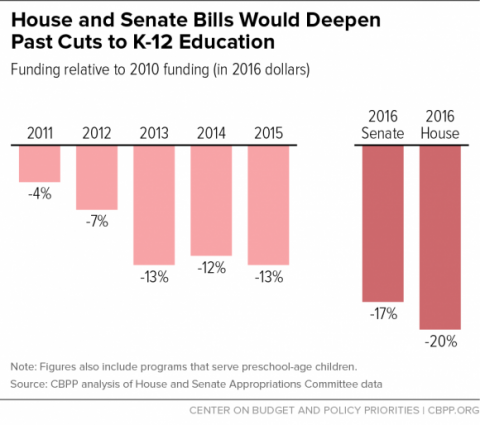
Tight Spending Caps Continue To Squeeze Important Priorities
As President Obama and Congressional leaders continue their budget discussions, it’s important to understand just how much is at stake for American families.
The 2011 Budget Control Act (BCA) placed strict caps on defense and non-defense programs funded through annual appropriations. These caps were then lowered under an automatic process called “sequestration” when Congress failed to enact further deficit reduction. For non-defense appropriations — a category that includes medical and scientific research, aid to education, veterans’ health care, national parks and environmental protection, housing assistance, public health, homeland security, law enforcement, and courts, to give a few examples — the overall cap has failed to keep pace with inflation and population growth and many programs within the category have been cut more deeply.
The cuts would have been even larger if President Obama and Congress hadn’t enacted measures that provided some relief from sequestration in the last three years, but that relief expires in 2016. Unless policymakers raise the caps by providing further sequestration relief, more cuts will follow.
Recent legislation approved by congressional committees gives us an idea of the impact of the tight funding caps.
Federal funding for preschool and K-12 programs, many of them for low- and moderate-income students, has shrunk by 13 percent since 2010 after adjusting for inflation, and new cuts approved by the House and Senate Appropriations Committees for 2016 would bring the total reduction since 2010 to 20 percent and 17 percent, respectively. The House bill would eliminate programs that help develop high-quality preschool programs, fund professional development for math and science teachers, and even those that aim to reduce school violence.
The same House bill would also slash funding for the implementation of health reform, eliminate assistance to family planning programs, and cut funds for teen pregnancy prevention by more than 90 percent.
Housing programs have also been on the sequestration chopping block. Cuts to Housing Choice Vouchers — which allow low-income families, seniors and people with disabilities to rent modest units of their choice on the private market — have meant that tens of thousands of families remain on waiting lists. Recent appropriations bills have failed to restore most of the 100,000 housing vouchers cut by sequestration.
In addition, the HOME Investment Partnership Program, which makes grants for the development and rehabilitation of affordable housing, is now funded at the lowest level since it began in 1992. Capital assistance to repair and rehabilitate public housing is 32 percent below the 2010 level, adjusted for inflation, while funding for assisted housing for elderly and disabled people is now less than half of the 2010 level in inflation-adjusted terms.
The tight caps don’t affect Social Security payments, but the agency’s administrative funding has been squeezed, despite a growing workload as baby boomers retire. As a result, Social Security Administration services are suffering, with reduced staffing and field office hours, longer waits for appointments and phone calls, and growing backlogs for disability appeals and other critical work.
Although kids, seniors, and families are hit hard by the caps, they aren’t alone. Many other programs face shortfalls unless Congress acts.
Against the backdrop of these dramatic cuts, it’s clear that there is a better way.
The President and congressional Democrats have pushed to raise the BCA’s caps for both non-defense and defense spending, offset by a mix of other cuts and revenue increases.
But congressional Republicans — who run both the House and Senate — have stuck to the tight caps for non-defense programs, while using a gimmick to evade the cap on defense.
Congressional leaders and the White House have finally started negotiating to raise the caps. They must come together and reach agreement to do so — as they did on a bipartisan basis in 2013 — and ensure that priorities that matter to families across America aren’t shortchanged even further.
David Reich is a senior policy consultant at the Center on Budget and Policy Priorities.



The views and opinions expressed in this post are those of the author(s) and do not necessarily reflect those of MomsRising.org.
MomsRising.org strongly encourages our readers to post comments in response to blog posts. We value diversity of opinions and perspectives. Our goals for this space are to be educational, thought-provoking, and respectful. So we actively moderate comments and we reserve the right to edit or remove comments that undermine these goals. Thanks!